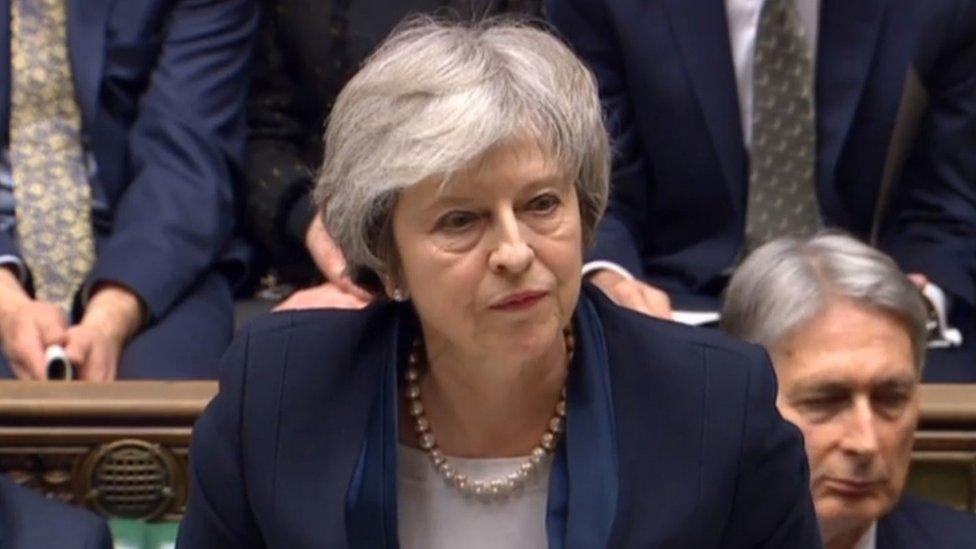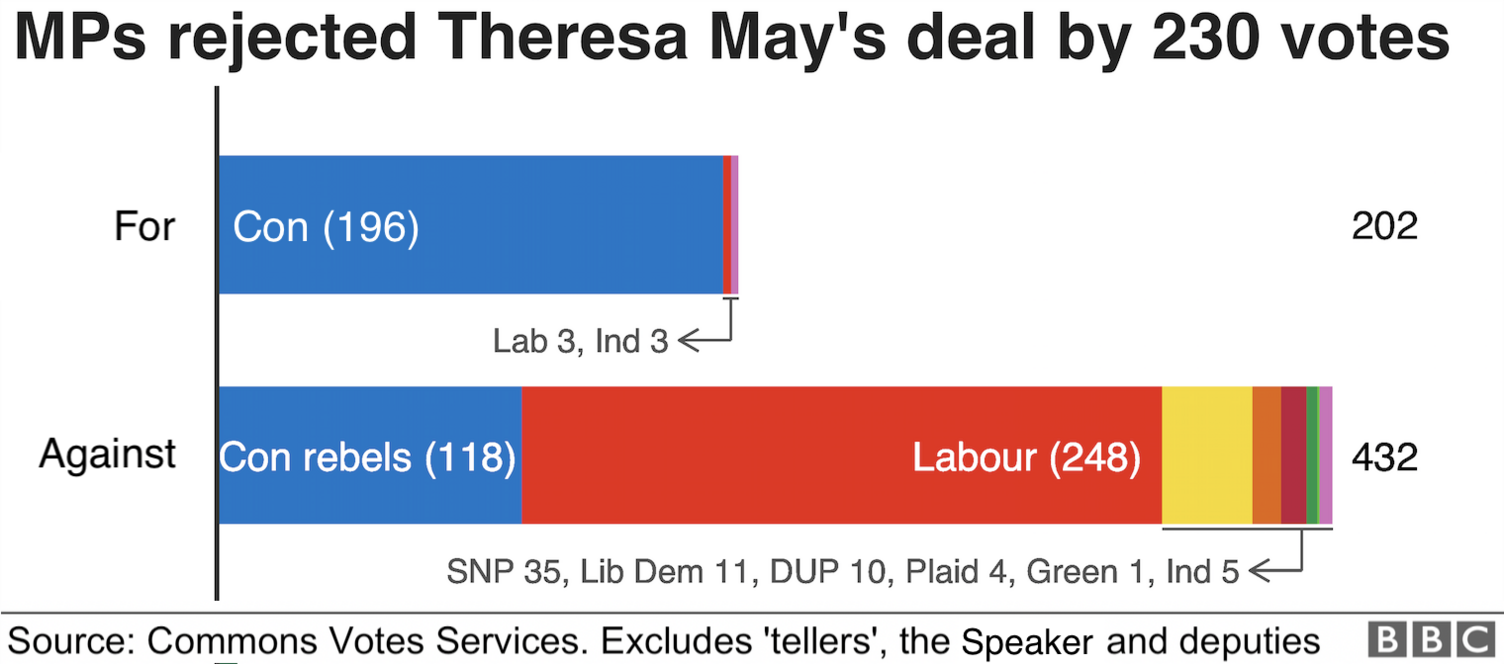Brexit: Nicola Sturgeon says another EU referendum 'only credible option'
- Published
- comments
Ms Sturgeon said the prime minister had suffered a defeat of historic proportions
Scotland's first minister has said another referendum on Brexit is now the "only credible option" after MPs rejected Theresa May's Brexit deal.
Nicola Sturgeon was speaking after MPs voted by 432 to 202 against the deal, which sets out the terms of Britain's exit from the EU on 29 March.
Labour immediately lodged a vote of no confidence in Mrs May's government following the defeat.
Ms Sturgeon is due in London to meet SNP MPs ahead of the confidence vote.
She said it was time to "stop the clock" on Brexit and "put this issue back to the electorate".
But Mrs May has signalled her intention to carry on despite suffering the largest defeat for any sitting UK government in history, and has offered cross-party talks in a bid to find a way forward from the current stalemate if she wins the no confidence vote on Wednesday.
In a statement released immediately after the vote, the prime minister said: "The House has spoken and this government will listen."
Ms Sturgeon, whose SNP MPs voted against Mrs May's deal, confirmed her party would back the no confidence motion - which Labour hopes will spark a general election.
And she said the "historic" scale of the defeat for the prime minister meant the country has now "reached the point where it would be unconscionable to kick the can any further down the road."
Ms Sturgeon added: "What must happen now is clear. Firstly, and most urgently, the clock must be stopped on the Article 50 process. This is the only way to avoid any possibility of the UK crashing out of the EU on 29 March without a deal.
"Secondly, legislation must be brought forward to put this issue back to the electorate in another referendum.
"The government has had more than two and a half years to deliver a workable Brexit plan and it has completely failed to do so. The notion that it can do so now in a matter of weeks is farcical."
The prime minister's Brexit deal is backed by 202 MPs but 432 vote against.
Ms Sturgeon said another EU referendum with Remain as an option was now the "only credible option to avoid untold damage to the economy and the prospects of future generations".
And she said it was "also the only option, within the UK, that would allow Scotland's democratic wish to remain in Europe to be respected".
Mrs May spoke to Ms Sturgeon on the phone late on Tuesday evening as the prime minister started to reach out to other parties.
In a post on Twitter following their conversation, Ms Sturgeon said it was "not obvious that she [Mrs May] has any real idea what to do next".
Allow X content?
This article contains content provided by X. We ask for your permission before anything is loaded, as they may be using cookies and other technologies. You may want to read X’s cookie policy, external and privacy policy, external before accepting. To view this content choose ‘accept and continue’.
The 35 SNP MPs were joined by every Scottish Labour and Liberal Democrat MP in rejecting the deal, as well as three Scottish Conservatives - John Lamont, Ross Thomson and Douglas Ross.
But it was backed by the other 10 Scottish Conservatives, including Scottish Secretary David Mundell.
Allow X content?
This article contains content provided by X. We ask for your permission before anything is loaded, as they may be using cookies and other technologies. You may want to read X’s cookie policy, external and privacy policy, external before accepting. To view this content choose ‘accept and continue’.
Mr Lamont, Mr Thomson and Mr Ross are expected to back the prime minister in the no confidence vote - as are the vast majority of the 115 other Conservative rebels and the DUP, which strongly opposes Mrs May's Brexit deal but says it wants a change of policy rather than a change of government.

Responding to the Commons vote, Labour's shadow Scottish secretary Lesley Laird said the prime minister had now lost all authority, and that there was now a "clear need for a general election to break the deadlock".
Scottish Liberal Democrat leader Willie Rennie, who backs another referendum on Brexit, said the "historic and devastating defeat" for the prime minister meant her deal and her credibility were now in tatters.
But the interim leader of the Scottish Conservatives, Jackson Carlaw, said the prime minister's proposals were the "only substantial deal on the table" that would "avoid No Deal and deliver an orderly Brexit".

Mr Carlaw also challenged Mrs May's opponents to "set out, quite specifically, how their own alternatives might work, how they would respect the referendum, and how they will secure a majority in parliament".
The President of the European Council, Donald Tusk, said he regretted the outcome of the vote and has urged the UK government to "clarify its intentions with respect to its next steps as soon as possible".

What happens in a vote of no confidence?
By the BBC's head of political research Peter Barnes
Under the Fixed Term Parliaments Act 2011, UK general elections are only supposed to happen every five years. The next one is due in 2022.
But a vote of no confidence lets MPs vote on whether they want the government to continue. The motion must be worded: "That this House has no confidence in HM Government."
If a majority of MPs vote for the motion then it starts a 14-day countdown.
If during that time the current government or any other alternative government cannot win a new vote of confidence, then an early general election would be called. That election cannot happen for at least 25 working days.